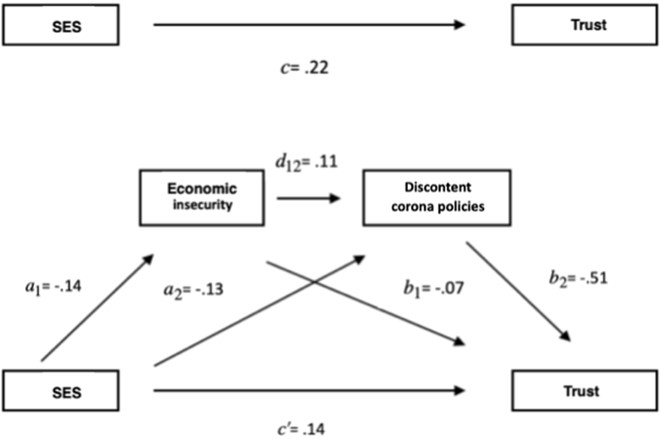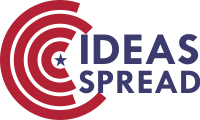Institutional Trust in Times of Corona
Abstract
During the corona pandemic, governments of all countries appealed strongly to the trust of their populations by implementing drastic social and economic measures to prevent the spread of the virus. This study seeks to understand mechanisms that influence the level of institutional trust at the time of the corona pandemic. We are specifically interested in how three explanatory factors (socioeconomic status, experienced economic insecurity and dissatisfaction with the implemented corona policies) can, in mutual association, explain differences in institutional trust. This study is based on data from a large-scale panel survey on the social impact of COVID-19, carried out by Kieskompas research agency (N=22,696). Using a serial mediation analysis, we show that SES has both a direct and indirect effect on the level of institutional trust. People with higher SES experience less economic insecurity and have less dissatisfaction with the corona policies and, partly as a result of this, stronger institutional trust. It is also true that economic insecurity increases dissatisfaction with the corona policies and, partly as a result of this, weakens the level of trust.
References
[2] Schraff, D. (2020). Political trust during the Covid‐19 pandemic: Rally around the flag or lockdown effects?. European journal of political research. SocArXiv 8 juni 2020. https://doi.org/10.31235/osf.io/pu47c
[3] De Vries, C. E., Bakker, B. N., Hobolt, S., & Arceneaux, K. (2020) Crisis Signaling: How Italy's Coronavirus Lockdown Affected Incumbent Support in Other European Countries. https://doi.org/10.2139/ssrn.3606149
[4] Bol, D., Giani, M., Blais, A., & Loewen, P. J. (2020) The effect of COVID‐19 lockdowns on political support: Some good news for democracy?. European Journal of Political Research, 60(2), 497-505. https://doi.org/10.1111/1475-6765.12401
[5] Mueller, J. E. (1970) Presidential popularity from Truman to Johnson. The American Political Science Review, 64(1), 18-34. https://doi.org/10.2307/1955610
[6] Chanley, V. A. (2002) Trust in Government in the Aftermath of 9/11: Determinants and Consequences. Political psychology, 23(3), 469-483. https://doi.org/10.1111/0162-895X.00294
[7] Hetherington, M. J., & Nelson, M. (2003) Anatomy of a rally effect: George W. Bush and the war on terrorism. PS: Political Science and Politics, 36(1), 37-42. Retrieved on 7 April 2021 from http://www.jstor.org/stable/3649343
[8] Dinesen, P. T., & Jaeger, M. M. (2013) The Effect of Terror on Institutional Trust: New Evidence from the 3/11 Madrid Terrorist Attack. Political Psychology, 34(6), 917-926. https://doi.org/10.1111/pops.12025
[9] Den Ridder, J., Vermeij, L., Maslowski, R., & Van ‘t Hul, L. (2021). Burgerperspectieven 2021, Kwartaal 4. Den Haag: Sociaal en Cultureel Planbureau. Retrieved on 7 November 2023 from https://www.scp.nl/publicaties/publicaties/2021/12/27/burgerperspectieven-2021---kwartaal-4
[10] Engbersen, G., van Bochhove, M., de Boom, J., Etienne, T.,van Lindert, J., Krouwel, A., Rusinovic, K., Snel, E., van Heck, L. en van Wensveen, P. (2021) De ongeduldige samenleving. De maatschappelijke impact van COVID-19 in Amsterdam, Den Haag, Rotterdam & Nederland. Rotterdam: Erasmus University. Retrieved on 7 November 2023 from https://www.impactcorona.nl/wp-content/uploads/2021/01/De-verdeelde-samenleving-210118.pdf
[11] Engbersen, G., van Bochhove, M., de Boom, J., Bussemaker, J., El Farisi, B., Krouwel, A., van Lindert, J., Rusinovic, K., Snel, E., & van Wensveen, P. (2020) De laagvertrouwen samenleving. De maatschappelijke impact van COVID-19 in Amsterdam, Den Haag, Rotterdam & Nederland. Rotterdam: Erasmus University. Retrieved on 7 November 2023 from https://www.impactcorona.nl/wp-content/uploads/2021/11/def-1-november_rapport_laag-vertrouwensamenleving_def83.pdf
[12] Zmerli, S., & Newton, K. (2017). Objects of political trust: Scales and hierarchies. In S. Zmerli en T. van der Meer (red.) Handbook on Political Trust. Cheltenham, UK: Edward Elgar Publishing, 104-124.
[13] Rothstein, B., & Stolle, D. (2008) The state and social capital: An institutional theory of generalized trust. Comparative Politics, 40(4), 441-459. https://doi.org/10.5129/001041508x12911362383354
[14] Uslaner, E. M. (2008). Trust as a moral value. In: E.M. Uslaner (red.) The handbook of social capital. Oxford: Oxford University Press, 101-121.
[15] Alesina, A., & La Ferrara, E. (2002) Who trusts others?. Journal of Public Economics, 85(2), 207-234. https://doi.org/10.1016/S0047-2727(01)00084-6
[16] Schmeets, H. (2017) Vertrouwen in elkaar en in de samenleving. Den Haag: WRR.
[17] Paxton, P. (2007) Association memberships and generalized trust: A multilevel model across 31 countries. Social Forces, 86(1), 47-76. https://doi.org/10.1353/sof.2007.0107
[18] Putnam, R. J. (2000) Bowling alone. The Collapse and Revival of American Community. New York: Simon & Schuster.
[19] Newton, K., & Zmerli, S. (2011) Three forms of trust and their association. European Political Science Review 3(2), 169-200. https://doi.org/10.1017/S1755773910000330.
[20] Newton, K., Stolle, D., & Zmerli, S. (2018). ‘Social and political trust’. In: E.M. Uslaner (ed.). The Oxford handbook of social and political trust. Oxford: Oxford University Press, 37-56.
[21] Hooghe, M., Dassonneville, R., & Marien, S. (2015). The impact of education on the development of political trust: Results from a five-year panel study among late adolescents and young adults in Belgium. Political Studies, 63(1), 123-141. https://doi.org/10.1111/1467-9248.12102
[22] Bovens, M., & Wille, A. (2008). Deciphering the Dutch drop: Ten explanations for decreasing political trust in the Netherlands. International Review of Administrative Sciences, 74(2), 283-305. https://doi.org/10.1177/0020852308091135
[23] Tiemeijer, W. L. (2008). Wat 93,7 procent van de Nederlanders moet weten over opiniepeilingen. Amsterdam: Amsterdam University Press.
[24] Brehm, J., & Rahn, W. (1997). Individual-level evidence for the causes and consequences of social capital. American Journal of Political Science, 41(3), 999-1023. https://doi.org/10.2307/2111684
[25] Jen, M. H., Sund, E. R., Johnston, R., & Jones, K. (2010). Trustful societies, trustful individuals, and health: An analysis of self-rated health and social trust using the World Value Survey. Health & Place, 16(5), 1022-1029. https://doi.org/10.1016/j.healthplace.2010.06.008
[26] Lindstrom, M., & Mohseni, M. (2009). Social capital, political trust and self-reported psychological health: A population-based study. Social Science & Medicine, 68(3), 436-443. https://doi.org/10.1016/j.socscimed.2008.11.004
[27] Zmerli, S., & Newton, K. (2011). ‘Winners, losers and three types of trust. In S. Zmerli en M. Hooghe (red.) Political Trust: Why Context Matters. Colchester: ECPR, 67-94.
[28] Uslaner, E. M. (2002). The moral foundations of trust. Cambridge: Cambridge University Press.
[29] Mishler, W., & Rose, R. (2001). What are the origins of political trust? Testing institutional and cultural theories in post-communist societies. Comparative Political Studies, 34(1), 30-62. https://doi.org/10.1177/0010414001034001002
[30] Catterberg, G., & Moreno, A. (2006). The individual bases of political trust: Trends in new and established democracies. International Journal of Public Opinion Research, 18(1), 31-48. https://doi.org/10.1093/ijpor/edh081
[31] Van der Meer, T., & Hakhverdian, A. (2017). Political trust as the evaluation of process and performance: A cross-national study of 42 European countries. Political Studies, 65(1), 81-102. https://doi.org/10.1177/0032321715607514
[32] Delhey, J., Newton, K. (2003). Who trusts?: The origins of social trust in seven societies. European Societies, 5(2), 93-137. https://doi.org/10.1080/1461669032000072256
[33] Wroe, A. (2016). Economic insecurity and political trust in the United States. American Politics Research, 44(1), 131-163. https://doi.org/10.1177/1532673X15597745
[34] Antonucci, L., Horvath, L., Kutiyski, Y., & en Krouwel, A. (2017). The malaise of the squeezed middle: Challenging the narrative of the ‘left behind’Brexiter. Competition & Change, 21(3), 211-229. https://doi.org/10.1177/1024529417704135
[35] Hacker, J. S., Rehm, P., & Schlesinger, M. (2013). ‘The insecure American: Economic experiences, financial worries, and policy attitudes’. Perspectives on Politics, 11(1), 23-49. https://doi.org/10.1017/S1537592712003647
[36] Kartseva, M. A., & Kuznetsova, P. O. (2020). The economic consequences of the coronavirus pandemic: which groups will suffer more in terms of loss of employment and income?. Population and Economics, 4(2), 26-33. https://doi.org/10.3897/popecon.4.e53194
[37] Hardin, R. (2006). Trust. Cambridge UK: Polity Press.
[38] Rothstein, B. (2011). The Quality of Government: Corruption, Social Trust, and Inequality in international perspective. Chicago: The University Of Chicago Press.
[39] Nicholls, K., & Picou, J. S. (2013). The impact of Hurricane Katrina on trust in government. Social Science Quarterly, 94(2), 344-361. https://doi.org/10.1111/j.1540-6237.2012.00932.x
[40] Van der Meer, T., & Dekker, P. (2011). Trustworthy states, trusting citizens? A multi-level study into objective and subjective determinants of political trust. In: S. Zmerli en M. Hooghe (eds), Political trust: Why context matters. Colchester: ECPR Press, 95-116.
[41] Xie, W., Campbell, S., & Zhang, W. (2020). Working memory capacity predicts individual differences in social-distancing compliance during the COVID-19 pandemic in the United States. Proceedings of the National Academy of Sciences, 117(30), 17667-17674. https://doi.org/10.1073/pnas.2008868117
[42] Hayes, A. F. (2017). Introduction to mediation, moderation, and conditional process analysis: A regression-based approach. New York: Guilford publications.
[43] Snel, E.., Engbersen, G., De Boom, J., & Van Bochove (2022). Social capital as protection against the mental health impact of the COVID-19 pandemic. Frontiers in Sociology, 7, article nr.728541. https://doi.org/10.3389/fsoc.2022.728541
[44] Schmeets, H., & Exel, J. (2020). Vertrouwen, maatschappelijk onbehagen en pessimisme. Statistische trends. Den Haag: CBS. Retrieved on 7 April 2021 from https://www.cbs.nl/nl-nl/longread/statistische-trends/2020/vertrouwen-maatschappelijk-onbehagen-en-pessimisme?onepage=true
[45] Snel, E., De Boom, J., & en Engbersen, G. (2021b). Vaccinatiebereidheid: een nieuwe kloof tussen arm en rijk’ (Working paper 5 Onderzoek Sociale impact van COVID-19). Retrieved op 7 April 2021 from https://www.impactcorona.nl/wp-content/uploads/2021/04/Vaccinatiebereidheid-een-nieuwe-kloof-tussen-arm-en-rijk.pdf
[46] Tiemeijer, W. L. (2020). Communicatie en draagvlak Covid-19. Den Haag: Wetenschappelijke Raad voor het Regeringsbeleid. Retrieved on 7 November 2023 from https://www.wrr.nl/wrr-en-corona/publicaties/publicaties/2020/10/12/communicatie-en-draagvlak-covid-19


This work is licensed under a Creative Commons Attribution 4.0 International License.
Copyright for this article is retained by the author(s), with first publication rights granted to the journal.
This is an open-access article distributed under the terms and conditions of the Creative Commons Attribution license (http://creativecommons.org/licenses/by/4.0/).









1.png)














